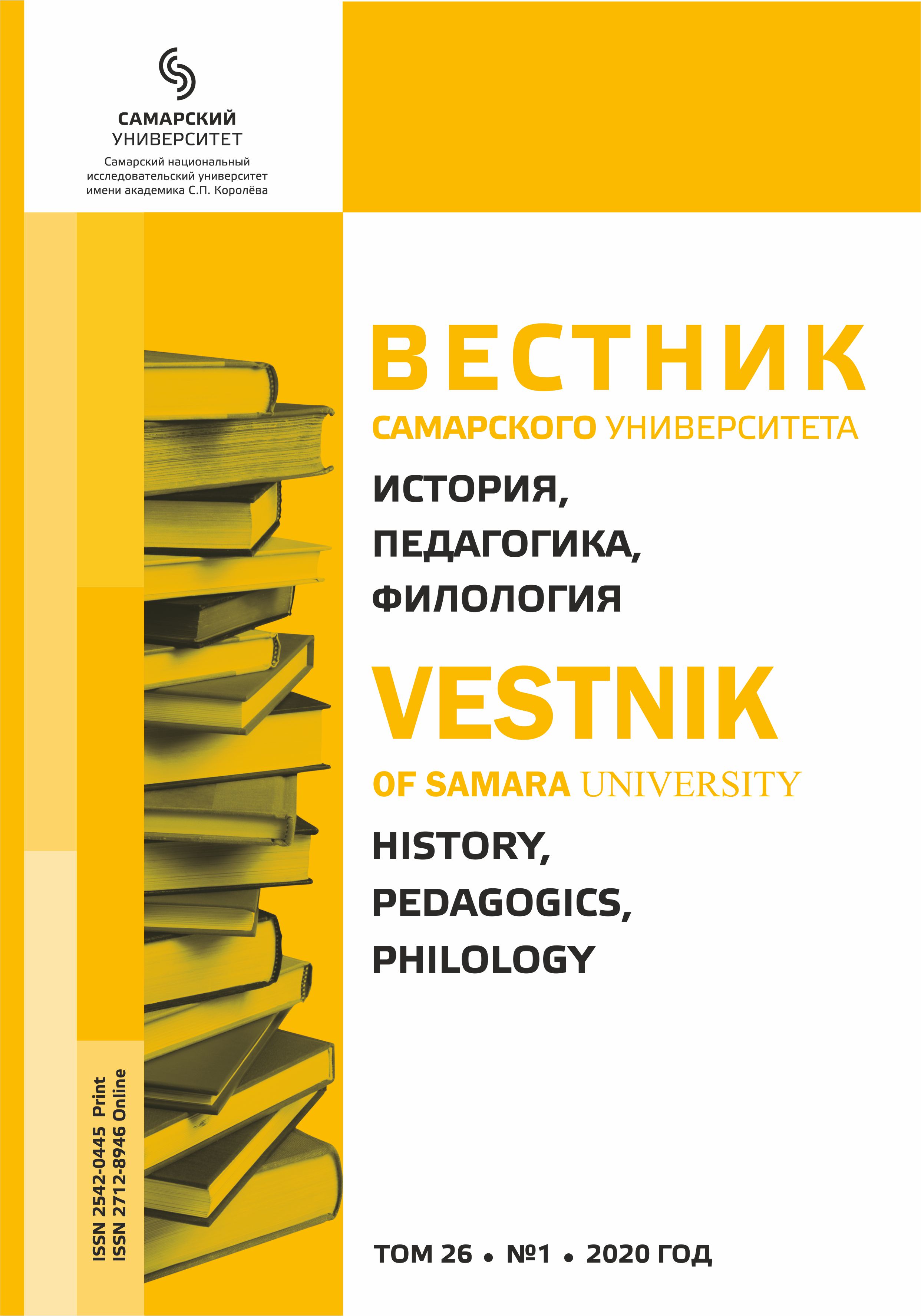Formation of the components of engineering expertise of generation Z students
- Authors: Faritov A.T.1
-
Affiliations:
- Ulyanovsk State University of Education
- Issue: Vol 26, No 1 (2020)
- Pages: 83-88
- Section: Articles
- URL: https://journals.ssau.ru/hpp/article/view/7732
- DOI: https://doi.org/10.18287/2542-0445-2020-26-1-83-88
- ID: 7732
Cite item
Full Text
Abstract
The article is devoted to the study of the features of generation Z of secondary school age and their influence on the formation of engineering competence. The necessity of introducing classes for the formation of engineering competence from the 5th grade is justified. The importance of the problem is due to the lack of case studies on the impact of age and psychological characteristics of generation Z on the process of forming engineering competence in extracurricular activities of students in grades 5–9. The analysis of thematic scientific literature has shown that in most cases the work is limited to the study of local aspects of the declared topic. Therefore, the main goal was to study the age peculiarities of pupils of generation Z in the formation of engineering competence (within the framework of extracurricular activities of pupils of 5–9 classes). Methodological base of the research is represented by a set of general scientific methods (description, comparison, generalization and system analysis) and a private scientific method – descriptive content analysis. Scientific novelty defines a set of qualities that are inherent to representatives of generation Z in middle school age and have a direct impact on the development of design and research skills of students in extracurricular activities. The practical and theoretical significance of the obtained results lies in the possibility of using them as a basis for drawing up methodological programs of students, writing fundamental compilation and original scientific papers, as well as creating a new classification of characteristics of representatives of the «new generation» in the educational process. The main conclusions: work on the formation of engineering competence and each of its components separately must begin at secondary school age; for a deeper and better development of the components of engineering competence, you should refer to the resources of extracurricular activities; generation Z needs a special approach to the formation of engineering competence in view of its inherent interests, needs and psychological and age characteristics.
About the authors
A. T. Faritov
Ulyanovsk State University of Education
Author for correspondence.
Email: morenov@ssau.ru
ORCID iD: 0000-0003-3073-8455
postgraduate studen
References
- Hampton, Keys 2017 – Hampton Debbie C. and Keys Yolanda (2017) Generation Z students: Will they change our nursing classrooms? Journal of Nursing Education and Practice, vol. 7, no.4, pp. 111–115. DOI: http://doi.org/10.5430/jnep.v7n4p111.
- Mohammad, Alireza, Fariba 2019 – Mohammad Afshin Afshar, Alireza Jafari, Fariba Heshmati, Farahnaz Movahedzadeh and Abour H. Cherif (2019) Instructional Strategies for Motivating and Engraining Generation Z Students in Their Own Learning Process. Journal of Education and Practice, vol. 10, no. 3, pp. 1–20. DOI: http://doi.org/10.7176/JEP/10-3-01.
- Moore, jones, Frazier 2017 – Moore K., Yones C., Frazier R.S. (2017) Engineering Education For Generation Z. American Journal of Engineering Education (AJEE), vol. 8, no. 2, pp. 111–126. DOI: http://doi.org/10.19030/ajee.v8i2.10067.
- Abramenkova 2018 – Abramenkova V.V. (2018) Social psychology of childhood. Moscow: PER SE, 431 p. (In Russ.) Available at: http://www.al24.ru/wp-content/uploads/2015/07/15.pdf.
- Altshuller 1979 – Altshuller G.S. (1979) Creativity as an exact science. Moscow: Sov. radio, 216 p. (In Russ.) Available at: http://www.rdita.kg/files/books/%D1%82%D1%80%D0%B8%D0%B7/Tvorchestvo_kak_tochnaya_nauka_G_S_Altshuller.pdf.
- Amelchenko 2013 – Amelchenko T.V. (2013) Operationally active component model formation of professional competence social worker in the regional context. Modern problems of science and education, no. 6, pp. 13–18. (In Russ.) Available at: http://science-education.ru/ru/article/view?id=10552.
- Bezrukova 1989 – Bezrukova V.S. (1989) Engineering and pedagogical training: modern trends. Sovetskaya pedagogika, no. 1, pp. 83–86. (In Russ.)
- Butsyk 2019 – Butsyk S.V. (2019) «Digital» generation in the educational system of the Russian region: problems and solutions. Open Education, vol. 23, no. 1, pp. 27–33 (In Russ.) DOI: http://doi.org/10.21686/1818-4243-2019-1-27-33.
- Zvonov 2018 – Zvonov P.A. (2018) Digital generation and its characteristics. Vestnik magistratury, no. 12–4 (87), pp. 79–81. (In Russ.) Available at: http://www.magisterjournal.ru/docs/VM87_4.pdf.
- Zimnaya 2013 – Zimnaya I. (2013) Competency and competence in the context of competence approach in education. Uchenye zapiski natsional'nogo obshchestva prikladnoi lingvistiki, no. 4, pp. 16–31. (In Russ.) Available at: http://www.elibrary.ru/item.asp?id=21611467.
- Craig, Baukum 2005 – Grace J. Craig and Don Baukum (2005) Human Development. Ninth edition. Saint Petersburg: Piter, 940 p. (In Russ.) Available at: http://ipkfp.nspu.ru/file.php/1/Kraig_Psikhologija_razvitija.pdf.
- Ribot 1901 – Ribot T. (1901). Law of development of imagination. Saint Petersburg: Tipografiya Yu.N. Erlikh, 1901, pp. 132–140. (In Russ.) Available at: http://www.psychology.ru/library/00050.shtml.
- Shapran 2013 – Shapran Yu.P. (2013) The components of professional competence of teachers of biology. Personality, family and society: issues of pedagogy and psychology: collection of articles on the materials of the XXXII international scientific and practical conference No. 9. Novosibirsk: Sibak. (In Russ.) Available at: http://sibac.info/conf/pedagog/xxxii/33939 (Аccessed 20.12.2019).
- Shishov, Agapov 2002 – Shishov S.E. and Agapov I.G. (2002) Competence approach to education: fad or necessity? Standards and monitoring in education, no. 2, pp. 58–62. (In Russ.) Available at: http://www.elibrary.ru/item.asp?id=21378160.
- Shmygova, Chekuleva 2016 – Shmygova I.S. and Chekuleva M.E. (2016) Applied problems – as a means of forming engineering competence of schoolchildren. Scientific community of students of the XXI century. Humanities: collection of articles based on the materials of the XLV international scientific and practical conference, no. 8, pp. 49–57. (In Russ.) Available at: http://sibac.info/archive/guman/8(45).pdf.
Supplementary files













